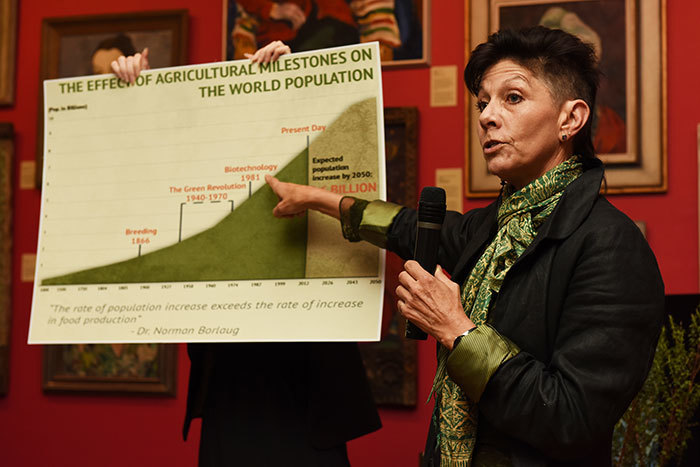Role model scientist: prestigious award for Farrant
18 June 2015 | Story by Newsroom
Professor Jill Farrant of the Department of Molecular and Cellular Biology is this year's recipient of the Erna Hamburger prize. This is awarded by the EPFL (Swiss Federal Institute of Technology) WISH Foundation (Women in Science and Humanities) to leading women in science, engineering and architecture worldwide. She spoke with Helen Swingler.
HS: Women from Ashton, MIT, CERN, the Max-Planck Institute, and a Nobel Prize-winner ... as a recipient of this prize you're in highly esteemed company. Did you know you were up for this honour?
JF: I had no clue that I was up for this award, and still do not know who nominated me nor how the nomination process works! When I received the email telling me that I had been named the Erma Hamburger Laureate by the EPFL-WISH Foundation, I initially thought it was a hoax. I sat on the email for two days before responding.
HS: What does an award like this mean to you as a woman researcher at the foot of Africa?
JF: To be honest, this award, with its implications that my science and personality can be considered role model status to biologists worldwide, is one of huge importance to me. If true (and I still wonder 'why me?') this is a responsibility that I hold with gravitas and not a small amount of nervousness!
HS: The award mentions that you're a great role model to biologists and to women and men in science the world over. What do you think are your strongest characteristics as a role model?
JF: This is not something that I can answer easily. I believe that my recognition has come largely because I have been able to utilise an excellent model system, involving very unusual plants that are largely endemic to Southern Africa, towards the fulfilment of a dream (as such, this is still what it is – although I believe that realisation of this dream is feasible, finances permitting, in my remaining working life) and that has potential value in procuring a degree of food security for our country in the future. It is predicted that much of Africa will be rendered a desert by 2060 due to the predicted effects of climate change. In summary, a novel concept with appealing outcomes that clearly raises public interest around a currently hot topic (climate change).Having said that, I am told that the quality of my research outputs, my passion for my science and relatively charismatic (again, this is hearsay) manner of presentation of my work has played a big part in my being invited to present at various international platforms. Another feature that has contributed towards my success, which I think is key to being a good role model, is that I collaborate widely with various experts in specific disciplines to obtain a comprehensive and thorough understanding of the rare phenomenon of vegetative desiccation tolerance. This has allowed for cross-discipline interactions and presents a model of co-operation, rather than competition, in advancing solutions to real problems across the globe.
HS: What is the value of role models in today's world of science?
JF: I believe that role models play an essential role in promoting a discipline or field of study. They attract people into that discipline and foster good science practice. This is particularly true in plant science – a discipline which often plays a poor cousin in relation to fields such as medical or animal sciences. The former, in particular, is considered important by most humans as they perceive a direct link to their health and wellbeing. What many don't perceive is that plants serve humanity in ways of huge importance. Without them, there will be no food, fewer medicines and oxygen reserves of our atmosphere will rapidly be depleted.
HS: Did you have a role model when you were starting out, someone who encouraged you to follow academia and then affirmed you a scientist?
JF: Yes. Supervisors of both my MSc and PhD studies, the late Professor Patricia Berjak and Professor Norman Pammenter, played a huge role in igniting my passion for science and, more importantly, in instilling in me the values and rigor required for excellence in research and in communicating this.
HS: Do you plan to go to Switzerland to deliver the lecture and accept the award? If so, do you have any idea what your topic is likely to be?
JF: I will be going to Lausanne in September to collect this award, where I will give a talk entitled 'My journey with resurrection plants towards food security in Africa'. This apparently will be delivered to some 500 to 600 people, followed by a banquet in my honour.
HS: Any other comments you'd like to add?
JF: As always, I acknowledge my students, and local and international collaborators, without whom none of my awards would have been possible. In particular, I thank Dr Suhail Rafudeen and Emeritus Professor Jennifer Thomson (Molecular and Cell Biology, UCT) for their huge input and support given me over the years. It also goes without saying that the support systems within MCB, the science faculty and our university have been crucial to my journey thus far.
Story by Helen Swingler.
 This work is licensed under a Creative Commons Attribution-NoDerivatives 4.0 International License.
This work is licensed under a Creative Commons Attribution-NoDerivatives 4.0 International License.
Please view the republishing articles page for more information.










